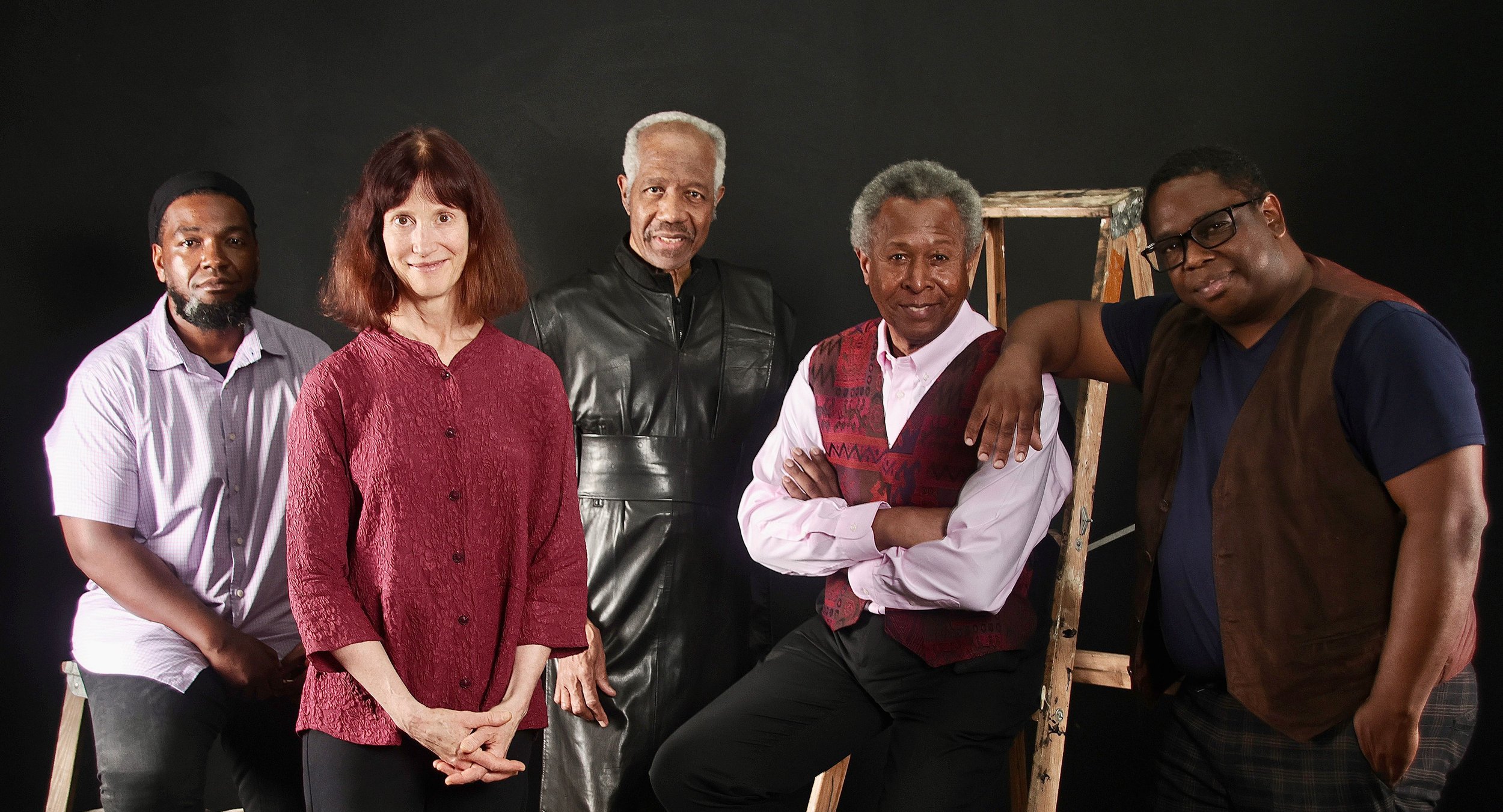Billy Harper to Present His Truth His Way at the Chicago Jazz Festival
The Billy Harper Quintet, left to right, is bassist Dezron Douglas, pianist Francesca Tanksley, tenor saxophonist Harper, drummer Aaron Scott, and trumpeter Freddie Hendrix. They will play Friday, August 30, 5:25, at Pritzker Pavilion. (Photo by Pin Lim).
Fifty-one years after introducing himself through the album Capra Black, tenor saxophonist Billy Harper believes his messages are still worth your attention.
Harper, who became an octogenarian on January 17, 2023, has released more than 20 albums, including the heralded Black Saint, Knowledge of Self, and Somalia. His compositions, “Croquet Ballet,” “Illumination,” and “Call of the Wild and Peaceful Heart,” have blossomed further into live, in-the-mind-and-body testimonies that performance attendees worldwide have admired for decades.
Harper’s quintet – trumpeter Freddie Hendrix, pianist Francesca Tanksley, bassist Dezron Douglas, and drummer Aaron Scott – will show what they are up to now at this year’s Chicago Jazz Festival. The hit will happen Friday, August 30, 5:25 p.m. at the Pritzker Pavilion in Millennium Park. For Harper, this occasion will allow him to reconnect with loyal listeners and welcome those who may not be familiar with his style.
“I want people to know me through my music. Hopefully, the music describes and defines who I am, how I am, and what I am all about,” Harper said, during a recent conversation. “Hopefully, the truth comes through. I am all about the truth.”
When asked which tunes he might play, Harper said, “I’d like for it to be a surprise for everybody, so I don’t want to give away too much.” He did, however, discuss his worthy constituents.
“They are very good musicians who have a feeling for my music,” he said. “When you hear Freddie Hendrix, it will feel like you’ve heard him forever.” Harper also praised Tanksley, the quintet’s senior member, who joined in 1983.
“Whenever I’ve written a new composition for the group, she knows the feeling I’m trying to get,” he said. “The fact that she feels what I feel in relation to that helps the group really understand what I’m trying to get across.
“There are different ways to play the piano and make it sound a certain way,” Harper continued, “and she has the right feeling, the right touch and everything. She understands.”
Tanksley, during a separate conversation, attributed her continued participation in Harper’s quintet to a “mystical musical connection.”
“First, there are his compositional gifts and performance talents. His music is inspiring. It gives me a chance to keep growing musically and spiritually,” said Tanksley, who met Harper in 1982 through trumpeter Wallace Roney and drummer Newman Taylor Baker, quintet members at that time. “Every time we play, the music is different. We just connect on a very high level. I don’t understand it. It must come from God.”
Trumpets, Drums, and African Rhythms
In 1969, while employed by the Thad Jones/Mel Lewis Orchestra, Harper participated in a recording session for Louis Armstrong and His Friends. Although he did not get to solo, Harper enjoyed hanging with Armstrong, whose approachability he found fun.
“One of the things I remember was saying, ‘Hey, Louie!” – as if I really knew him – ‘how was it when you traveled to Europe?’ ” Harper recalled. “He liked for younger musicians to ask questions. He was cool.
“(This experience) felt like a connection to history,” he continued. “It was like a continuation of the whole idea of improvisation and jazz music, so it was like being a part of that stream of history.”
From 1998 to 2003, Harper recorded with Africa Brass, led by the Chicago-based trumpeter Malachi Thompson. This particular sextet, which also included alto saxophonist Gary Bartz, released three albums and performed them at the Green Mill. “We had a lot of good sessions there,” Harper said. “That club is a draw for the real listeners.”
Harper’s credentials also include recordings in the ‘60s and ‘70s with drummers Art Blakey and Max Roach. Absorbing energy from Buhaina – Blakey’s Islamic surname – and observing Roach’s persistent precision, remain in his conscience.
“The way that Art played always made it a lesson that you learned,” Harper said. “He would play and play (behind you), and you would think that you were finished, but then he would go to another level that made you bring out more.”
And Max?
“He was a typical Capricorn, straight ahead, on time. He had an album called It’s Time,” Harper said. “Everything was about time, and he was all about time. I am a Capricorn, too, so we got along very well.”
From 1973 to 2016, Harper would be featured on five Randy Weston albums, some featuring trombonist Melba Liston, and others the ensemble, African Rhythms. In 2013, Weston and Harper released a duet album, The Roots of the Blues.
“He and I were very close with that one,” Harper recalled. “The main source and feeling of the music came from the feeling of the blues, and Randy knew that back and forth.
“Randy taught a lot just by the way he played. He could bring out certain things and feelings just from the way he voiced his chords,” Harper continued. “It made you play a certain way, ya know? I loved the way he played. He had the right soul.”
Weston’s biographer, Willard Jenkins, discussed The Roots of the Blues with the pianist, who passed away in 2018. After recalling how they first played together in Tangier, Morocco, Weston explained to Jenkins why he wanted to record one-on-one with Harper.
“When Billy plays the tenor it’s like an orchestra – the call & response is always there; I always hear the black church in his playing; he’s always singing through his horn,” Weston said in an article posted on Jenkins’ website, openskyjazz.com. “As far as why we work well together, it’s the magic, that big, black sound he gets. Billy’s sound (he has Somali roots) comes straight out of Africa, but it’s a universal sound – that cry, it reaches your soul. He plays that modern saxophone but it’s very poetic. You listen to his solos and it’s a full composition, you hear the whole history of the tenor.”

